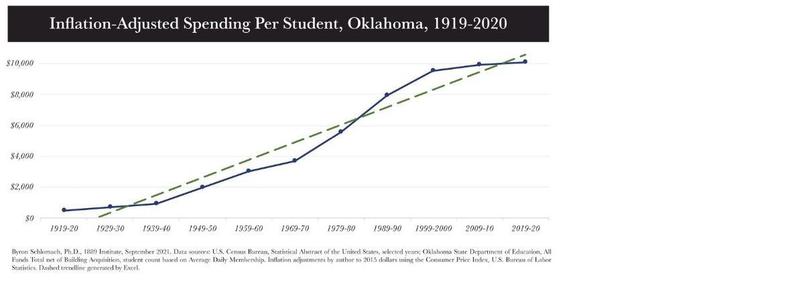
Education
Oklahoma’s unaccountable public schools
February 16, 2022
Brandon Dutcher
Oklahoma’s public schools are not held accountable democratically, financially, or educationally. Real accountability to parents trumps fake accountability to government.
What do voters consider most important when it comes to public education? According to a 2018 survey commissioned by the Oklahoma Education Association, it’s not money. It’s “accountability.”
Many Oklahomans are under the impression that our public schools are in fact accountable. After all, schools are subject to a dizzying array of laws and regulations—on matters ranging from curriculum and testing to fire drills to administering epinephrine. (Researchers at the 1889 Institute pored over Oklahoma’s school administrative code and found roughly 640 mandates.)
But here’s the thing: “Bureaucratic compliance” is not synonymous with “accountability.” Far from it.
The dictionary definition of “accountable” is basically “answerable.” Webster gives this example: “held her accountable for the damage.”
“Holding people accountable requires that they face significant consequences as a result of their actions,” says education scholar Jay P. Greene. “Despite years of ‘high stakes’ student testing, very few of the nation’s 3.14 million public-school teachers have ever lost a job, had their pay reduced, or otherwise faced meaningful consequences because of these test results.”
In Oklahoma, only 24% of our students are “proficient” or better in academic performance, according to the state’s public-education “accountability” system. So where’s the accountability? How many schools have been closed? How many grown-ups have lost their jobs or had their pay reduced? Who’s being held accountable for the damage?
Former superintendent Shawn Hime once remarked that it’s heartbreaking to “see a student who is valedictorian from a school and they made a 14 on the ACT.” He’s absolutely right. So who got fired?
When I reminded one teacher that Oklahoma has 400,000 school-produced illiterates, he chose to look on the bright side. “I would be willing to bet they still had teachers that cared for and about them,” he replied.
Well, sure. Even so, their lives have been altered forever. Vast sums of money and God-given potential were wasted. Who’s being held accountable for the damage?
It’s not just academic performance. Consider the problem of bullying. It persists year after year—despite numerous rules and regulations on the books—sometimes with tragic and heart-rending consequences.
Sexual abuse and harassment, too. Year after year. “Based on what I heard from my constituents,” said former state Rep. Rebecca Hamilton (D-Oklahoma City), “sexual harassment of girls in our public schools is close to being pro forma.” Yet do the adults face meaningful consequences for failing to build a healthy school culture?
“In reality, there is no entity in America that is less accountable than a government-run school system,” says retired public-school teacher Larry Sand.
“Public schools are not held accountable either democratically, financially, or educationally,” says former teacher Michael McShane. “We know this because we can see the turnout numbers of local school board elections and look on what days they are held; we can survey parents about how and how much their schools are spending and see that they are completely in the dark; and we can try and make heads or tails of school accountability systems and find loophole after loophole. In all cases, we find little evidence that these mechanisms are doing what advocates say that they are.”
Worse yet, “there’s a tradition in education,” former school administrator Frank Macchiarola and co-author Thomas Hauser point out, “that if you spend a dollar and it doesn’t work, you should spend two dollars; and not only that, you should give those two dollars to the same person who couldn’t do the job with only one.”
Alas, that’s been the experience here. Oklahoma’s public education problems “are not due to underfunding,” says Oklahoma State University entrepreneurship professor emeritus Vance Fried. “Since 1972, per-pupil spending has almost doubled in real terms with no improvement in academic outcomes.”

Nor are our problems due to underregulation. Education scholar Corey DeAngelis points out that “according to the QuantGov database, the number of K-12 education restrictions has increased by almost 1,200 percent since 1970, while student achievement hasn’t budged.”
Encouragingly, a plurality of Oklahoma voters understands that our public schools lack accountability. Rules and regulations, whether 640 of them or 6,400 of them, are but a pale imitation of true accountability—to parents.
Indeed, because private-school parents can vote with their feet, McShane notes, “private schools are more accountable than traditional public schools.”
“The ultimate accountability for anything is you moving your dollars away,” says Oklahoma Senate leader Greg Treat, author of the Oklahoma Empowerment Act. “Parents will keep these educational institutions more honest than any government intervention could.”
As many a beleaguered mall retailer can tell you, real accountability is an empty parking lot.
“Real accountability to parents,” says scholar Greg Forster, “trumps fake accountability to government.”
It’s not accountability if no one is held accountable.
[An earlier version of this article appeared at Education Post.]